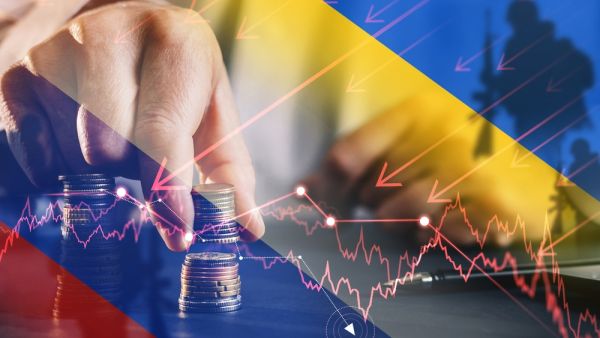ALBAWABA - As 2023 approaches, Russia's war in Ukraine is showing no sign of abating, food supply chains remain disrupted, fuel prices are zig-zagging, currencies and stock markets are jittery, global inflation is skyrocketing, liquidity is scarce and economic activity is idle.
Economic experts paint a gloomy image on the state of global economy as the world wraps up a year it had hoped would achieve "recovery" in the wake of the COVID-19 pandemic, which brought many economies to their knees.
While the inflation rate in the United States is envisioned at 7 percent at the end of the last quarter of 2022, the global average is 9.5 percent, according to the Germany-based IFO Institute for Economic Research. "While we had previously anticipated contractions in several economies, the gloom has spread such that we now see global GDP rising by just 1.7 percent next year," said Jennifer McKeown, chief European economist at Capital Economics, an independent economic research business based in London.
War returned to Europe in 2022, and few facets of life were left untouched.
— The Associated Press (@AP) December 11, 2022
Russia’s invasion of Ukraine unleashed misery on millions of Ukrainians, shattered Europe’s sense of security, ripped up the geopolitical map and rocked the global economy. https://t.co/ynkkcGebAZ
"Excluding the GFC and COVID, this would mark the slowest pace of global growth in four decades," she added, referring to the COVID-19 pandemic, which brought global economic activity to a virtual standstill as a result of closures and lockdowns to impede the spread of the deadly virus. GFC points to the Global Financial Crisis, the period of extreme stress in global financial markets and banking systems between mid 2007 and early 2009.
The World Bank predicted that global growth may decelerate markedly from 5.5 percent in 2021 to 4.1 percent in 2022 and 3.2 percent in 2023 as pent-up demand "dissipates and as fiscal and monetary support is unwound across the world."
The Economist was blunt. It said that global recession was "inevitable" in 2023, citing the fallout from the Russian war in Ukraine, including a possible nuclear escalation, and the far-reaching sanctions slapped on Russia.
A bank study released three months ago cautioned of a recession in the New Year. "As central banks across the world simultaneously hike interest rates in response to inflation, the world may be edging toward a global recession in 2023 and a string of financial crises in emerging market and developing economies that would do them lasting harm," according to a comprehensive new study by the World Bank," according to the study.
World Bank Group President David Malpass warned that global growth "is slowing sharply, with further slowing likely as more countries fall into recession."
"My deep concern is that these trends will persist, with long-lasting consequences that are devastating for people in emerging markets and developing economies,” he said. “To achieve low inflation rates, currency stability and faster growth, policymakers could shift their focus from reducing consumption to boosting production."
"Policies should seek to generate additional investment and improve productivity and capital allocation, which are critical for growth and poverty reduction," Malpass added.
In Jordan, a cash-strapped Arab nation saddled by a multibillion-dollar debt and depends on foreign donations to keep its moribund economy afloat, the effect of global inflation sent shockwaves across the kingdom, driving its consumer price inflation to 5.2 percent in October, compared with 1.6 percent in November 2021, growing at an average annual rate of 13.29 percent, according to World Data Atlas, Knoema.
New #Jordan Economic Report: The country's economy is projected to grow by 2.1% in 2022. However, rising commodity prices, supply bottlenecks & the impact of the war in Ukraine pose major downside risks to economic outlook.
— World Bank MENA (@WorldBankMENA) July 18, 2022
Learn more: https://t.co/ahPRQyhvbs pic.twitter.com/NLm74ePCSg
Subsequently, there was an across-the-board increase in commodity prices, which jumped by at least 40 percent this year, according to government figures released by the Jordan News Agency, Petra. Prices of fuel derivatives also increased at least six times since the beginning of 2022, resulting in violent riots in various parts of the country, known for its unmatched record of stability in the volatile Mideast. At least four policemen were killed in the violence and subsequent raids.
Many Jordanians, already with dents in their pockets, argue that their purchasing power is the weakest ever as their wages remained the same in the past three years, despite the continuous rise in prices, making it difficult for many to make ends meet.
"The situation is terrible, I'm unable to provide for my family," said civil servant Mohammad Taha, 39, a father of four who earns nearly $1,200 a month from his main job in a public office and a part-time night job as a taxi driver. "Many days, my children go to bed without food."
"There is no light at the end of the tunnel and the situation is getting worse," he told Albawaba in an interview.
Similar concerns were echoed by many in Egypt, where experts estimate that the Egyptian pound has lost between 20 to 25 percent of its value against the greenback since the beginning of 2022, the French Le Monde newspaper reported. As a result, consumer price inflation hit a four-year record high of 15 percent, according to Egypt Today, which quoted data by the Central Agency for Public Mobilization and Statistics.
"This year has been the worst for me so far," said Ahmad Sultan, 31, an electronic engineer working for a local firm in Cairo. "It feels like my income fell by 50 percent as a result of the increased prices."
HSBC Economist Roadshow has optimistic predictions for oil-rich Gulf counties which is likely to hit the highest growth rate in the world for the year 2022. According to a recent analysis by the group, the economies of the Gulf region are expected to grow by 6.5 percent in 2022, making it one of the best-performing in the world, achieving its largest growth in at least a decade, with expectations of economic growth of five percent for the next year.
For Saudi Arabia, an expert in the U.A.E. said the Saudi economy is expected to enlarge by seven percent this year and is likely to hit from two to three percent in 2023. Saudi Arabia is one of the largest oil producers worldwide, with 10.5 million barrels per day, which maintain its strong economy.
In cooperation with Jamal Halaby, news adviser







